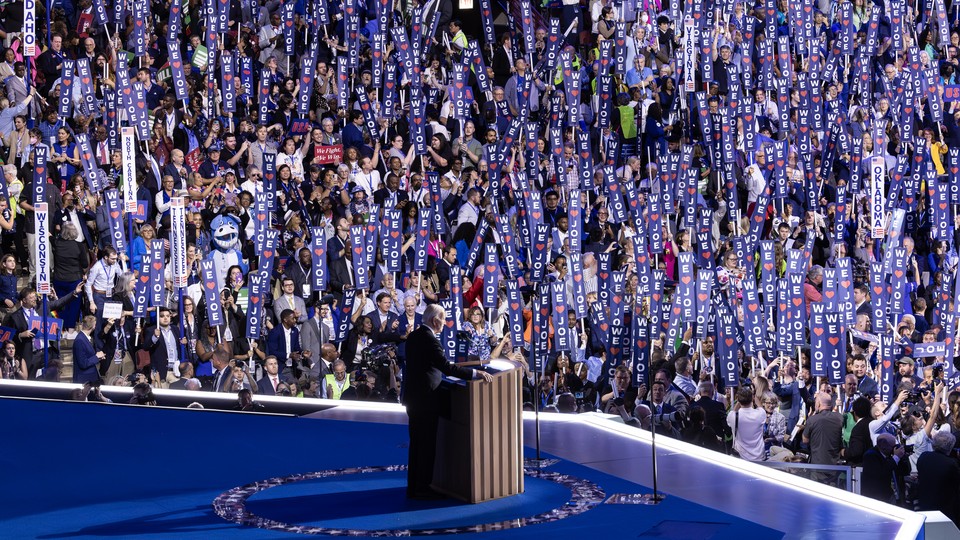The Democrats Hone Their Trump Narrative
6 min read
This is an edition of The Atlantic Daily, a newsletter that guides you through the biggest stories of the day, helps you discover new ideas, and recommends the best in culture. Sign up for it here.
Lora Kelley: Observers in the media have talked about the Harris campaign’s “vibes” as a way to describe the newfound energy she’s brought to the ticket. How would you describe the vibes at the convention so far?
Helen Lewis: The energy was a lot higher than I think it would have been with Biden as the nominee. With him, there would have been a sense of watching a guy carry a vase across a heavily polished floor—a feeling of trepidation about watching him speak and how many events he was supposed to do. All that’s gone away. One of my favorite things that I saw last night was a group of people wearing light-up cowboy hats. That gives you an idea of the vibe: This is the kind of place where you can wear an unironic light-up cowboy hat. Despite the poor timekeeping of the first night (Biden didn’t speak until well after 11 p.m. eastern time), there’s a confidence and a lightness to the convention. There is merch in “brat” green.
Lora: How were people at the convention talking about Biden and his farewell speech?
Helen: There was a feeling that Biden had done the right thing, and so people needed to be gracious and give him his night. You might think that’s quite self-indulgent when you’ve got an election to win and you’ve only got four nights of convention to land your points. But there is a point to the decency of giving Joe Biden his victory lap. A party that treats its members well and embeds their legacy is a party that can attract good candidates.
The Democratic Party is in touch with its former iterations. You had Hillary Clinton speaking last night; you have Michelle and Barack Obama talking tonight. That’s not the same with the Republican Party. People from the pre–Donald Trump era are not around.
Lora: What messages did the first night’s speakers emphasize? What didn’t they focus on?
Helen: Democrats are running on a change message. This means that the Democrats don’t have to defend every cough and spit of Biden’s legacy, which they would have to if he was a nominee. They would have to make the case that the past four years have been absolutely brilliant and fantastic, and we should have another four of them. Instead, they can say, Well, you like bits of Biden and want some continuity, but here’s this new, fresh candidate.
They’ve also downgraded the Biden electoral strategy, which was Democracy is at stake. An existential sort of attack on Trump—This guy’s a would-be tyrant—seems to be less effective than the framing of He’s weird, and the Republican Party is a cult.You can observe that pivot in the way the speeches are going. Alongside the references to Project 2025—which has become a vaguely sinister catch-all term for “Republican policies you’ll hate”—speakers are mocking and dismissing Trump. Hillary Clinton even allowed herself a wry smile when she mentioned Trump’s felony conviction and the crowd started to chant, “Lock him up.” Harris and Tim Walz have been shutting down those chants on the road, but I guess Clinton felt differently, given her experience in 2016.
Harris is emphasizing a unity message too. There is a constant use of we—her speech ended with “When we fight, we win,” which the crowd also chanted. That’s a contrast to the Hillary Clinton slogan “I’m with her,” which was foregrounding the fact that it was a her for the first time. One of the things I found interesting is the extent to which they’re making this about Harris being the first woman, and the first woman of color, to potentially be president—I would say the level is low to medium. I don’t think that first female president is going to be the way Kamala Harris runs this.
Lora: So what parts of her identity is she foregrounding?
Helen: Harris and her surrogates are leaning into her record in California: Their side’s got a felon; we’ve got a prosecutor. Simply running as not Donald Trump is also likely to capture an enormous amount of votes.From the point of view of journalists, we’re annoyed she’s given so few interviews, and the policy platform has, until recently, been quite sketchy. But from Harris’s point of view, I think that the unknown elements of the campaign have worked out quite well for her.
The journalists haven’t had much space at the convention, and it’s hard to get on the floor. But content creators are getting lots of space to spread out. The campaign presumably loves them, because it’s like journalism without the hard questions—it’s fandom that looks like information delivery. There’s a huge right-wing ecosystem of influencers and creators, and there’s a real feeling on the left that they need to build a mirror to that, and get their own cheerleaders.
Related:
- Joe Biden’s late goodbye
- The mistake that could cost Trump the election
Here are four new stories from The Atlantic:
- The new AOC
- David Frum: The defeat-Harris, get-Trump politics of protest
- Abortion takes center stage.
- The warehouse worker who became a philosopher
Today’s News
- Nicole Shanahan, Robert F. Kennedy Jr.’s running mate, said that Kennedy’s campaign is weighing whether to “join forces” with Trump’s campaign or stay in the race.
- Barack Obama will speak tonight at the Democratic National Convention, and delegates will hold a “celebratory” roll call to nominate Kamala Harris as the party’s presidential candidate.
- Six people, including a British tech mogul and a Morgan Stanley executive, remain missing after a tornado sank a yacht off the coast of Sicily, killing at least one person.
Dispatches
- Work in Progress: The White House simply does not have great tools to bring the cost of living under control, Annie Lowrey writes.
Explore all of our newsletters here.
Evening Read

The Far Right Is Becoming Obsessed With Race and IQ
By Ali Breland
“Joining us now is Steve Sailer, who I find to be incredibly interesting, and one of the most talented noticers,” Charlie Kirk said on his internet show in October. Kirk, the 30-year-old founder of Turning Point USA, a right-wing youth organization, slowed down as he said “noticers,” looked up at the camera, and coyly flicked his eyebrows.
That term—noticer—has become a thinly veiled shorthand within segments of the right to refer to someone who subscribes to “race science” or “race realism,” the belief that racial inequities are biological. In his interview with Kirk, Sailer noticed that “Blacks tend to commit murder about 10 times as often per capita as whites, and it’s not just all explained by poverty.” Sailer, one of the most prominent peddlers of race science in the United States, has made a career out of noticing things.
Read the full article.
More From The Atlantic
- Sean O’Brien walked right into it.
- Adam Kirsch: The false narrative of settler colonialism
Culture Break

Look up. Last night, people around the world saw a blue sturgeon supermoon. These photos captured the event.
Watch. Francis Ford Coppola’s1974 film The Conversation (available to rent on Prime Video), captured anxieties about the emerging surveillance state—and how it made workers feel at their job, Mark Asch writes.
Play our daily crossword.
P.S.
Seeing President Biden wipe tears from his face as he both approached and stepped back from the lectern last night, I thought back to Fintan O’Toole’s moving 2020 New York Review of Books essay, “The Designated Mourner,” in which he describes the president as “the most gothic figure in American politics.” Biden, O’Toole writes, “who once promised to turn back time, is an increasingly poignant embodiment of its pitilessness.”
— Lora
Sign up for The Decision: A 2024 Newsletter, in which Atlantic writers help you make sense of an unprecedented election.
Stephanie Bai contributed to this newsletter.
When you buy a book using a link in this newsletter, we receive a commission. Thank you for supporting The Atlantic.



